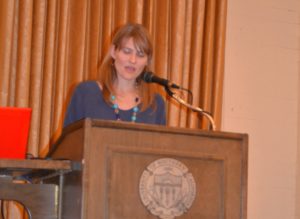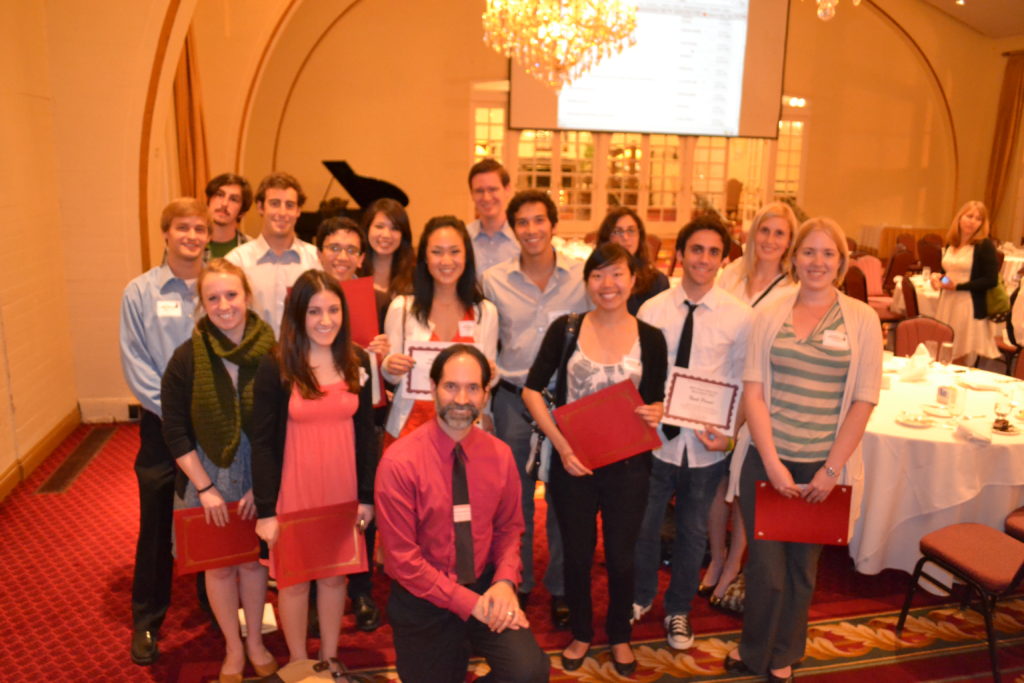8th Annual Undergraduate Writers’ Conference
Wednesday, March 30, 2011
Conference Director: Caley O’Dwyer Feagin
Keynote Speaker: Dana Goodyear
2011 Program
Analytical Essay
Researched Essay
Professional Writing/Moral Reasoning
Creative Work
Photos
Analytical Essay (123 submissions)
Honorable Mention
Tiffany Yang
Oscillations of Race and Memory: The Stained Path to “A More Perfect Union”
Yang undertakes a complex and nuanced analysis of Obama’s 2008 speech, “A More Perfect Union.” She views the speech through a framework of racial discourse, informed by readings of Martí’s “Nuestra América,” Unamuno’s “En torno al casticismo” and Faulkner’s “Requiem for a Nun”; these related texts “dance collectively with the rhetoric and content of Obama’s speech” and expose its internal contradictions regarding race, memory and history. Yang persuasively argues that “A More Perfect Union” is “not a triumph because it redefined America’s conversation about race” but “because it renewed and revived this conversation.”
2nd Prize
Jason Lipshin
Casual Labor: How Farmville Converges Consumption, Production, and Play
Lipshin’s provocative analysis of the on-line farming game, Farmville, argues that the web 2.0 spaces for the production and distribution of “user-generated content” blur the distinction between play and labor, thereby diminishing the creative power of play. Tracing the twentieth century shift from “a Fordist to a Post-Fordist economy,” Lipshin exemplifies Farmville as a networked playsite that disguises its data-collecting methods, potentially exploiting users as unwitting and unwaged laborers for advertisers.
1st Prize
Colin Dwyer
Who and What Art Thou?”: The Question of the Child in Peter Pan
Dwyer’s essay offers a sophisticated exploration of the degree to which adult subjects can successfully capture the essence of childhood. Designed in part as a response to recent criticism of children’s literature, his essay illustrates the futility such adult characters face through its reading of Captain Hook, whose attempts to understand Peter Pan are thwarted by the boy’s ability to embody multiple selves through forgetfulness. The essay ultimately reveals Peter Pan’s success as children’s literature by studying its narrator’s similar “forgetfulness,” and the way in which shifts of both perspective and person encourage children’s active participation in the narrative.
Researched Essay (121 submissions)
Honorable Mention
David Branch
The Subway to the Sea
David Branch’s analysis of the failure to expand the Los Angeles public transportation system—particularly the 30-year delay in building the fabled “Subway to the Sea”—unearths the interest-group politics, budgetary woes, and cultural pessimism that have so eluded progress. Branch’s thorough presentation of the difficulties nonetheless gives cause for optimism as he carefully assesses the pros and cons of the many alternative plans, and makes sensible suggestions for better policy.
Honorable Mention
Gregory Woodburn
Twain Marks of Memory: Time, Loss, and Their Intersection in Mark Twain’s Two
Autobiographies
Woodburn’s sophisticated analysis of Twain’s two autobiographies focuses on Twain’s use of writing as a means for recovering history, places, and loved ones lost to time’s inexorable race towards the future. Woodburn writes, “Following the chronology of event recollection rather than event occurrence, Twain places memory at the forefront of the Autobiography by depicting the past not as a passive timeline, but instead as an active component of the present.” Woodburn’s writing evocatively conveys the aching losses so potent in Twain’s work.
2nd Prize
Zara Lukens
The Political, Social, and Institutional Causes of the Disparity between Water System Effectiveness in Uruguay and Argentina
Lukens meticulously examines the contrast between the water governance policies of Uruguay and Argentina, identifying various rhetorical strategies used to garner influence in the increasingly contentious debate on the control and commodification of water. Drawing many logical parallels between democracy as a governance method and the power over and access to clean, safe water, she carefully avoids oversimplifying the debate. We finish her analysis with not only a better understanding of the two countries’ handling of a major resource but of the evolving field of water policy in general.
1st Prize
Stephen Lamb
“Wicked and Diverse Opinions”: Controlling Heresy in the Henrician Reformation
In Lamb’s extensive examination of heresy in the Henrician Reformation, he posits that heresy is not a group of “fanatic individuals,” but a “powerful legal tool” that “shaped many non-doctrinal aspects” of the Reformation. Presenting readers with original documents used in the heresy trials, Lamb thoroughly shows how, at least in the case of Anne Askew in 1546, leading conservative officials “attempted to resolve their religious and political problems” in the trial as opposed to in other alternative venues.
Professional Writing/Moral Reasoning (94 submissions)
Honorable Mention
Luia Yen
An Argument in Favor of Corporate Social Responsibility
This articulate, well-organized “argument in favor of corporate responsibility” makes a compelling case for regulations protecting society from the “external costs” of corporate business. Taking issue with the view that a corporation’s only obligation is to maximize profits, Luia argues that in fact corporations must meet a “moral minimum” obliging them to avoid harming others as a consequence of corporate practices. Luia introduces a number of outside sources from both sides of the debate that provide readers with a full picture of what’s at stake—a range of information made easily absorbable thanks to the sharpness and clarity of Luia’s prose.
2nd Prize
Madison Ainley
Authority through Relevancy: On Modernizing the United Nations Security Council
Membership Structure
Ainley’s essay presents a detailed, well-researched response to a difficult issue that touches both social morality and public policy. While skillfully laying out the various issues surrounding the Council’s membership structure, the essay provides a clear platform for argument by establishing the need to reform before tackling the complex question of how to go about it.
1st Prize
John (Charlie) Mach
Impact of Hospice Care on Healthcare Costs and Patients’ Quality of Life
Charlie’s essay on the virtues of hospice care addresses the difficult issue of End of Life treatment with depth and precision. Demonstrating a keen understanding of his rhetorical situation, his argumentative acumen comes across particularly powerfully in his commanding use of evidence. Clearly labored over, though never laborious, Charlie’s paper makes a compelling case for hospice care as a humane alternative to traditional treatment paths that, as Charlie shows, can be as emotionally costly as they are economically unsound.
Creative Work (175 submissions)
Honorable Mention
Paige Cohen
What We Hang on the Walls
In Cohen’s emotionally potent short story, a wise, caustic narrator provides a damning reflection on her family on the eve of her eighteenth birthday. The reader is immediately engaged by this girl who renames her sister “Bitch” and her parents “Dick” and “Jane” and who is able to discuss major family traumas—bulimia and sisters who trip on cough syrup and mothers that just don’t care—in subtle, poignant ways. Cohen writes with decisive control over voice, tone, and character.
Honorable Mention
Charles Green
Death in Texas
Charles Green’s two-character one-act play, “Death in Texas,” is grittily realistic. In a motel room in Waco, Angus and Sarge are cooking up crime and drinking their way into the past. Without being derivative, the writing covers Sam Shepard territory, where past and present collide in a bleak landscape populated by unhinged men who know they are alive only as long as they keep talking.
2nd Prize
Taylor Friedman
Frozen Cherry Custard
Neurologists tell us that nothing in the sensory realm evokes memories the way that smells do. The problem in Taylor Friedman’s “Frozen Cherry Custard” is that the odors that haunt Evie Benny come from nowhere in the immediate world. These smells transport her from the tense realities of marital and parental life into scenes from her younger years. Friedman’s writing is taut, fluent and sophisticated, very much inside the world of her protagonist, and she has a rare quality for a young writer: she trusts her reader.
2nd Prize
Lesley Wasserman
Captive in Communes of Charlatans Confined in the Company of Callow Animals
Wasserman plays with words, pop culture, musical terminology, and literary allusion as she builds her unique poetic voice. While some poems echo rapping rhymes and rhythms, others feature shorter, more biting lines and topics range from Holocaust camps to childhood memories, Roman art in marble to adolescent love and friendship to variations of the color “green.”
1st Prize
Sarah Boots
The Poetry of Science
Boots’ work provides an unexpected and rewarding pairing: though we may be aware of the shared elegance of poetry and nature, it isn’t often we seek warmth and humanity within the elevated diction of academic science. A sharply-observed take on daily life surfaces within the framework of larger, ostensibly abstract scientific principles. Her poem Entropy, for example,discusses astronomy and solar winds but ends with the mundane yet beautiful tragedy that occurs when “The boy with the newspapers passes your house/so the crossword puzzle goes undone.”
Photos







